 Loading...
Loading...
November 2017 – Newsletter
 Loading...
Loading...
 Loading...
Loading...
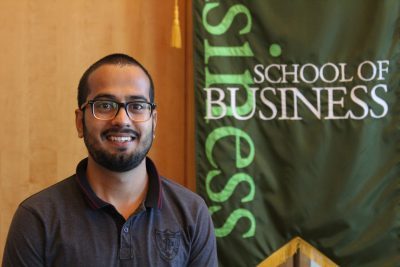 Niraj Sharma is a Business Analytics and Project Management (BAPM) graduate student in the OPIM department who was able to see the benefits of a BAPM graduate degree after working for two years. Sharma began his career as a test analyst at an international company called Tata Consultancy Services. Sharma’s job was to test capital market applications before they were released to the public. The process of testing was relatively manual, involving time consuming script writing, and Sharma realized this wasn’t the most effective use of his time. In an effort to improve efficiency, Sharma and his team introduced the concept of automation. This digitized the script writing so the employees could save time and still make their clients happy. After showing his innovative skills and gaining valuable experience in the field, he was able to meet directors and, most importantly, business analysts.
Niraj Sharma is a Business Analytics and Project Management (BAPM) graduate student in the OPIM department who was able to see the benefits of a BAPM graduate degree after working for two years. Sharma began his career as a test analyst at an international company called Tata Consultancy Services. Sharma’s job was to test capital market applications before they were released to the public. The process of testing was relatively manual, involving time consuming script writing, and Sharma realized this wasn’t the most effective use of his time. In an effort to improve efficiency, Sharma and his team introduced the concept of automation. This digitized the script writing so the employees could save time and still make their clients happy. After showing his innovative skills and gaining valuable experience in the field, he was able to meet directors and, most importantly, business analysts.
“A business analyst is actually the one who is the messenger. They are in contact with the topmost people and they bring the information from the CEO and CFO to the people on the bottom. They understand both the business and the technical parts of the company.” It is because of Sharma’s innate interest in both the business and the technological aspects of stocks and capital that he decided to go back to school and get his graduate degree. BAPM will give Sharma the the tools to be successful on the technical side as well as on the management side, and the curriculum at UConn gives him the flexibility to direct his own path.
The flexibility to taking electives, such as Predictive Analytics and Business Statistics, was what attracted Sharma to the UConn’s BAPM program the most, broadening his horizon to a new world of opportunities. Through the program, Sharma was able to land an on campus job as a lab assistant in the Gladstein Lab, home of OPIM Innovate. This job is not only good for the experience, but it gave him the opportunity to take on the data analytics track which he helped to build from the ground up. “I like this job because it is similar to what I am learning (so I can explore) and I also love to work with technology.” Working in the lab exposes Sharma to a variety of new tools, including Splunk, an emerging platform in the field of analytics.
Although Niraj has just begun his graduate program here at UConn, he has big plans for his future. After graduation, he wants to join a firm in the capital market domain because of the rapid growth the market is experiencing and the increase in consumer demand for these domains. However, this is not his ultimate goal. Sharma wants to climb the corporate ladder to become a chief technical officer in the capital market domain. As chief technical officer, he will guide the firm on which technologies to focus on in order to benefit the company in the future.
On Friday November 10, the Operations and Information Management (OPIM) department held a workshop on Blockchain. In his third workshop of the semester, adjunct professor Stephen Fitzgerald, a UConn alumnus and Management Information Systems (MIS) graduate, was faced with the difficult task of explaining the intricacies of Blockchain in a ninety minute time frame.
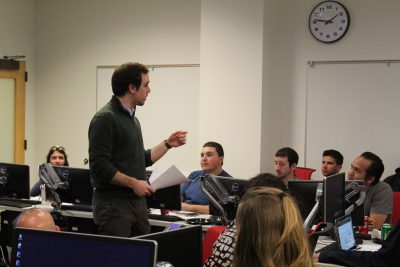 Blockchain is a peer to peer distributed database that records transactions. “Everyone can have a copy of the ledger, the list of all records, and see every transaction. Because everyone has this ability, everyone can check and make sure that the lists are correct,” said Fitzgerald. Each group of transactions gets added to the ledger as a different block, and it becomes a chain because each block builds upon the data from the first block. Although the concept of Blockchain is relatively new, it is not a new technology. Instead, it is a system that uses existing technologies, that wouldn’t normally be combined, in new ways. “It’s sort of a greater than the sum of its parts product” using elements of cryptography, accounting, and math to create the database.
Blockchain is a peer to peer distributed database that records transactions. “Everyone can have a copy of the ledger, the list of all records, and see every transaction. Because everyone has this ability, everyone can check and make sure that the lists are correct,” said Fitzgerald. Each group of transactions gets added to the ledger as a different block, and it becomes a chain because each block builds upon the data from the first block. Although the concept of Blockchain is relatively new, it is not a new technology. Instead, it is a system that uses existing technologies, that wouldn’t normally be combined, in new ways. “It’s sort of a greater than the sum of its parts product” using elements of cryptography, accounting, and math to create the database.
Blockchain can be used for a variety of different things such as to track produce, ensure flawless audit trails, assist lawyers with contracts, and utilize cryptocurrency. In an example given by Professor Fitzgerald, Blockchain can track produce, diamonds, and other goods back to their source. This is because Blockchain provides a seamless trail from the first stage of production until its final destination. The blocks in a block chain are interconnected and because the chain of transaction trails is open to the public, the tracking of produce will forever lead in the right direction, and the same goes for audit trails.
Perhaps one of the most common users of Blockchain is a cryptocurrency called Bitcoin. Cryptocurrency is a digital currency that can eliminate the necessity of a bank. Turner Carnes, an MIS student who attended the workshop emphasized the importance of blockchain in Bitcoin saying, “it has the potential to grow and be used in a lot of big businesses for more security with transactions.” Because all of the transactions will be made public and everything is built upon the previous transaction, there is a permanent trail for big business to track their money. Although this is a great idea, Bitcoin was running into issues because of the anonymity in the app. Because no names or identification were used, it was difficult for users to establish trust in the people they were sending their Bitcoins to. This is when Ethereum developed smart contracts. Smart contracts are contracts developed by users in order to legally bind people to their word. Once this contract is created, it is coded into the Blockchain and becomes a permanent part of the block. In the future, these contracts can be applied to real estate and law.
Although this was a denser topic than some of the previous workshops, Professor Fitzgerald did a great job translating the complicated Blockchain system into terms that the audience could understand. Michael Greco a freshman MIS major said, “it wasn’t like a class. The instructor was very engaging so it was really fun. I’d love to go to more workshops in the future.” The OPIM Innovate workshops are a great way to expose students to advanced technology and give them the opportunity to learn in a fun, interactive environment.
The next workshop on Microcontroller Applications will be held Friday, December 1st at 1PM in the OPIM Gladstein Lab on the third floor of the School of Business.
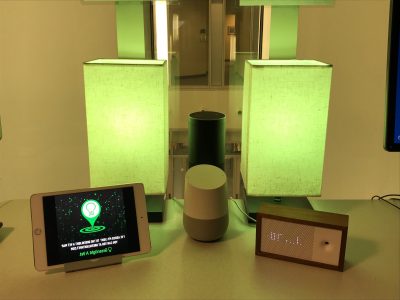 On Friday November 10th, LIFX, a company that creates smart lightbulbs, decided to participate in a movement that began in 2013, Greenlight A Vet. The company states that changing your lights to green is an easy way to establish visual support for America’s veterans by changing lights to green. The color green represents hope and positive well-being and green light is to show forward movement or advancement towards the cause. Once a participant change their lights to a particular color green they will appear on the LIFX greenlight map. The green light map shows where people in the United States have been using the app to change their lights to green. To raise awareness of the campaign, participants are encouraged to share their green light on the map and post on social media. A a user is encouraged to share a photo of the green light using the hashtag #greenlightavet. If not interested in sharing a photo, an alternative way to raise awareness is by applying the Greenlight A Vet filter onto a profile picture on Facebook.
On Friday November 10th, LIFX, a company that creates smart lightbulbs, decided to participate in a movement that began in 2013, Greenlight A Vet. The company states that changing your lights to green is an easy way to establish visual support for America’s veterans by changing lights to green. The color green represents hope and positive well-being and green light is to show forward movement or advancement towards the cause. Once a participant change their lights to a particular color green they will appear on the LIFX greenlight map. The green light map shows where people in the United States have been using the app to change their lights to green. To raise awareness of the campaign, participants are encouraged to share their green light on the map and post on social media. A a user is encouraged to share a photo of the green light using the hashtag #greenlightavet. If not interested in sharing a photo, an alternative way to raise awareness is by applying the Greenlight A Vet filter onto a profile picture on Facebook.
Once this campaign reached the OPIM Innovate email inbox we wanted to participate. As part of our Internet of Things (IoT) demo in our innovation space and research lab we have a number of LIFX smart lightbulbs. Tyler Lauretti, (MIS ’18), the OPIM Innovate Lab Manager suggested we set up our display and participate in the movement. Once we had set up all the equipment we were able to see Storrs, CT (06269) highlighted on the green light map. It was a powerful way to use data and technology to support a very important cause and showed the students in the lab the different ways you can become involved.
On Friday November 3, the Operations and Information Management (OPIM) team held one of its most successful workshops to date in the Gladstein Lab on Unity Virtual Reality (VR) Programming. The workshop, led by adjunct professor Stephen Fitzgerald, focused on acquainting people with Unity VR by “showing its historical progression, introducing students to the equipment, and teaching students how to stage a virtual reality space and make a virtual environment.”
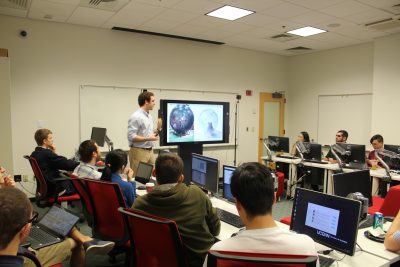 Virtual reality can be run through many different platforms but Professor Fitzgerald focused on the Unity software for the workshop. “The Unity engine is just something that has done all the hard work for you already. So the physics and the calculation of the computer code has all been done for you.” Giving students a background on the Unity engine will help them build confidence to be able to create their own virtual reality experiences. TJ Hannon, a student lab specialist for OPIM Innovate is in charge of the Virtual Reality technology track and was helping run the workshop. The lab is currently focusing on a virtual reality hardware called HTC Vive, one of the top-tier pieces of equipment that is “a lot more immersive and gives you the potential to do a lot of different things, especially in a professional setting” Hannon stated. OPIM Innovate is also looking to develop a Unity technology track that focuses on developing these type of experiences.
Virtual reality can be run through many different platforms but Professor Fitzgerald focused on the Unity software for the workshop. “The Unity engine is just something that has done all the hard work for you already. So the physics and the calculation of the computer code has all been done for you.” Giving students a background on the Unity engine will help them build confidence to be able to create their own virtual reality experiences. TJ Hannon, a student lab specialist for OPIM Innovate is in charge of the Virtual Reality technology track and was helping run the workshop. The lab is currently focusing on a virtual reality hardware called HTC Vive, one of the top-tier pieces of equipment that is “a lot more immersive and gives you the potential to do a lot of different things, especially in a professional setting” Hannon stated. OPIM Innovate is also looking to develop a Unity technology track that focuses on developing these type of experiences.
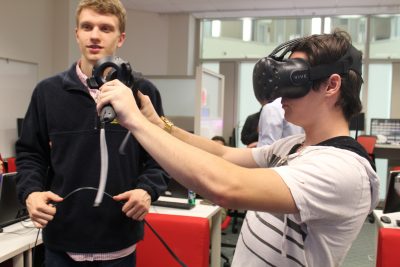 Although virtual reality is relatively new, its real world applications are endless. So far, it has been used to train doctors and surgeons, to treat people with anxiety and fears, to improve athletics, to train military personnel, to assist in construction and home design, and even to help paralyzed people walk again. In one instance during the workshop virtual reality was used along with a brain interface machine to restore people’s ability to walk when they were paralyzed. Because of virtual reality, paraplegics were able to have their bodies recreate cells that wouldn’t have otherwise been created in order to get themselves to walk again.
Although virtual reality is relatively new, its real world applications are endless. So far, it has been used to train doctors and surgeons, to treat people with anxiety and fears, to improve athletics, to train military personnel, to assist in construction and home design, and even to help paralyzed people walk again. In one instance during the workshop virtual reality was used along with a brain interface machine to restore people’s ability to walk when they were paralyzed. Because of virtual reality, paraplegics were able to have their bodies recreate cells that wouldn’t have otherwise been created in order to get themselves to walk again.
“The potential is limitless,” said Hannon about the future of virtual reality. Professor Fitzgerald stated “Right now the software is lacking graphically and the hardware can’t keep up with desired output, but if the right software and the right minds get a hold of the technology VR could change the world as we know it.” This workshop focused on giving people more exposure to the field as well as the tools needed to succeed.
The next workshop will be held on Friday, November 10, on an Introduction to Blockchain in the OPIM Gladstein Lab on the third floor of the School of Business.
On 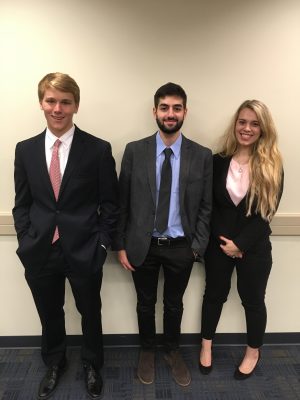 October 27 the University of Connecticut School of Business participated in the Travelers IT Case Competition. In this year’s competition, six teams representing schools all across Minnesota and Connecticut, competed against each other in an effort to market insurance to millennials using technology. Each team was given two weeks to create a innovative strategy to tackle this problem. They were allotted 20 minutes to present their ideas towards a solution in front of a judging panel of Travelers’ senior management. Following the presentation, the judging panel had ten minutes to ask any questions they had in regards to the project.
October 27 the University of Connecticut School of Business participated in the Travelers IT Case Competition. In this year’s competition, six teams representing schools all across Minnesota and Connecticut, competed against each other in an effort to market insurance to millennials using technology. Each team was given two weeks to create a innovative strategy to tackle this problem. They were allotted 20 minutes to present their ideas towards a solution in front of a judging panel of Travelers’ senior management. Following the presentation, the judging panel had ten minutes to ask any questions they had in regards to the project.
Each school invited was allowed one team, composed of three members chosen from the school’s sponsor. The participants from the University of Connecticut, Victoria Trautman (MIS), Benjamin Bosco (MIS), and Arshia Monshi (Business Administration), were introduced two weeks prior to the competition and given the case to work on. The team decided to build a seamless platform that included both a website and application that tied into a dash cam system. In theory, the app would connect to the dash camera that records a user as he or she drives to see how many times a millennial checks his or her phone. In order to spread word of such an app, the group implemented a detailed social media strategy to enhance the application’s popularity and usage rate.
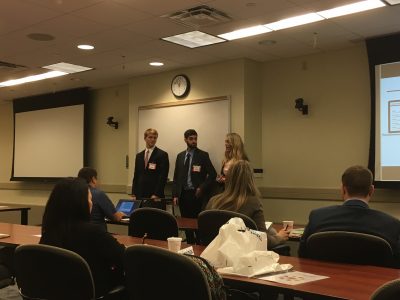
Case competitions are important to give students the exposure to real world problems and encourage their critical thinking, problem solving, and leadership skills. Victoria Trautman (MIS), spoke of the importance of participating in case competitions saying, “it is a great learning experience working with people from all over the Connecticut area in different fields.” This case competition was especially important to the students because it acted as a round of an interview for the summer internship program they were all trying to get in to. This allowed them to show off their presentation skills while networking with potential future employers.
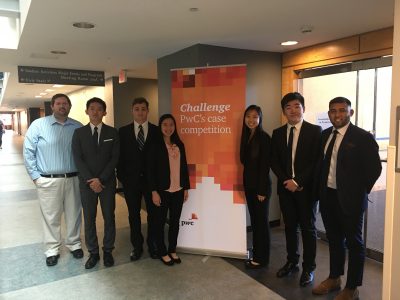 On October 27, twenty five students from the University of Connecticut School of Business were invited to participate in PwC’s annual case competition. They broken down into five separate teams and each were assigned a PwC mentor and a faculty mentor from the School of Business. The teams had two weeks to create a strategy to push Country’s Best convenience store, a real-world client of PwC, to full automation. Each team was allotted ten minutes to present their ideas towards a solution in front of a judging panel of PwC’s senior management. Following the presentation, the judging panel had ten minutes to ask any questions they had in regards to the project.
On October 27, twenty five students from the University of Connecticut School of Business were invited to participate in PwC’s annual case competition. They broken down into five separate teams and each were assigned a PwC mentor and a faculty mentor from the School of Business. The teams had two weeks to create a strategy to push Country’s Best convenience store, a real-world client of PwC, to full automation. Each team was allotted ten minutes to present their ideas towards a solution in front of a judging panel of PwC’s senior management. Following the presentation, the judging panel had ten minutes to ask any questions they had in regards to the project.
The team represented by Michael Greco (’21), Scott Kwon (’21), Tiffany Cheung (’20), Xiangyu Mu (’19), and Karina Zhao (’20) was mentored by MIS Academic Director, Jonathan Moore. “Our team’s plan of action was to implement automation in stages across the different tiers, grow a loyalty program, and introduce a private label in the stores. We wanted to adjust to the changing market environment while maintaining the close-knit, community feel of Country’s Best,” said Karina Zhao, a sophomore accounting major.
Although the case was heavily focused on the accounting and finance fields, the team was able to include their knowledge from a variety of their business courses, specifically marketing and management, in order to build their action plan. Case competitions are “a great opportunity to apply knowledge you learn in business classes, meet new people, and network with professionals,” said Karina. They allow students to get the exposure to the real world that is unparalleled in the classroom.
If interested in an internship in engineering, finance, human resources, or program representatives, the General Dynamics Electric Boat is looking for interns for the summer of 2018. Applications are open to students eighteen years or older who have completed their freshman year of college, are US citizens, and are available to work 40 hours per week for eight weeks or more between May 2018 and September 2018.
If qualified, please visit www.gdeb.com/careers between Wednesday, November 1, 2017 and Friday, January 5, 2018. Applications submitted after January 5, 2018 will not be considered.
For more information, please contact Brenda Petell at bpetell@gdeb.com
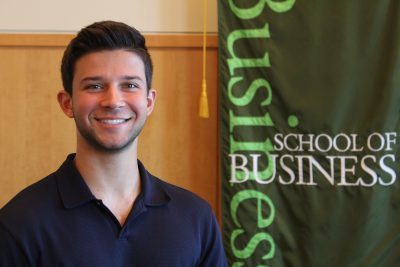 “The trick is to accomplish great things while balancing what you love and not working yourself to death,” said Evan Gentile (’18), a Management and Engineering for Manufacturing (MEM) major who balances school, work, and research while remaining involved in the UConn Community. “As a child I was infatuated with personalized flight, like the Iron Man suit,” and he preferred deconstructing his electronic toys as opposed to actually playing with them. Since then, Evan’s interest in technology has shaped him into the successful MEM student he is today. The MEM major is a part of both the School of Engineering and the School of Business, which allows for graduates to have flexibility between whether they want to be engineers or focus more on the business aspect. With this dual degree, Evan is hoping to gather enough engineering and business background to one day start his own company, and he is on the right track for doing so.
“The trick is to accomplish great things while balancing what you love and not working yourself to death,” said Evan Gentile (’18), a Management and Engineering for Manufacturing (MEM) major who balances school, work, and research while remaining involved in the UConn Community. “As a child I was infatuated with personalized flight, like the Iron Man suit,” and he preferred deconstructing his electronic toys as opposed to actually playing with them. Since then, Evan’s interest in technology has shaped him into the successful MEM student he is today. The MEM major is a part of both the School of Engineering and the School of Business, which allows for graduates to have flexibility between whether they want to be engineers or focus more on the business aspect. With this dual degree, Evan is hoping to gather enough engineering and business background to one day start his own company, and he is on the right track for doing so.
While at UConn Evan has made sure to keep his schedule busy with ample extra curricular activities revolving around his engineering and technological interests. Evan focuses on mentorships for younger MEM students as a TME Mentor for the MEM major experience, a First Year Experience (FYE) Mentor, and a floor mentor for the Innovation Learning Community. Anyone who has a question regarding MEM can reach him through any of these platforms for advice and guidance. As an FYE Mentor, he also held a position as a TA for the University Experience course, which helped him to network and gain membership in the Stanford University Fellows Program. This program focuses on networking with students who have a passion for entrepreneurship and innovation, connecting Evan with students internationally through the Stanford University Design School. Despite all of these accomplishments, Evan is most proud of his position as Vice President and Head Engineer of the UConn Electric Motor Sports Team, which is a club he helped start this fall. The goal of the club is to build a new, top-of-the-line electric race car, and Evan is in charge of building its subsystems. Ideally the car will be brought to a competition in Canada in June where it will race other cars from over thirty other university teams.
In addition to leading these clubs and organizations, Evan emphasizes that learning outside of the classroom is just as important as in the classroom, something he frequently relays to his students. For the past two years, Evan has focused on two different independent research studies. In the Material Science Department, Evan’s research focused on water desalination using a carbon based polymer that the department was making. The idea behind this is “to make it cheaper to pull salt and other pollutants out of the water to make it drinkable.” This way people around the world would have easier access to clean water, a green initiative that Evan is passionate about. More recently, Evan has been working on a research project on Artificial Intelligence (AI) under Management Information Systems (MIS) Director Jonathan Moore. For this project, Evan is working on loading an algorithm on a microcontroller that can recognize faces and determine whether or not someone has access to certain information. Luckily for Evan, microcontrollers and 3D printing are two of his specialties when he’s working for Professor Moore in the OPIM Innovate Initiative.
All of this experience with MEM helped Evan qualify for an internship and co-op program at a small company that builds treadmills without motors. As long as someone was using the treadmill, the track would spin as your legs move. Evan’s job at the company was to create a generator that made electricity while someone ran, and the electricity would power a screen to tell the user how fast he or she was running. This job helped Evan get a sense of what working at a company was like. “My vision for a lot of companies that I was excited to work at was similar to a Santa’s Workshop sort of thing; everyone would be enthusiastic, employees would be working nonstop, and there would be a bunch of energy there, and it’s more that companies are full of people just like me and you.”
If it wasn’t for Evan’s independent, self-guided desire for achievement and knowledge, he wouldn’t have taken advantage of the abundant amount of resources the University of Connecticut has to offer. “Persistence is dedication,” Evan said in regards to his successes. “Don’t be discouraged when doors get shut on you. You have to develop a certain attitude in order to succeed.” Evan is now beginning the job search for the next chapter of his life. He is hoping to find a small company close to home to get himself started and is looking forward to what MEM has in store for him next.